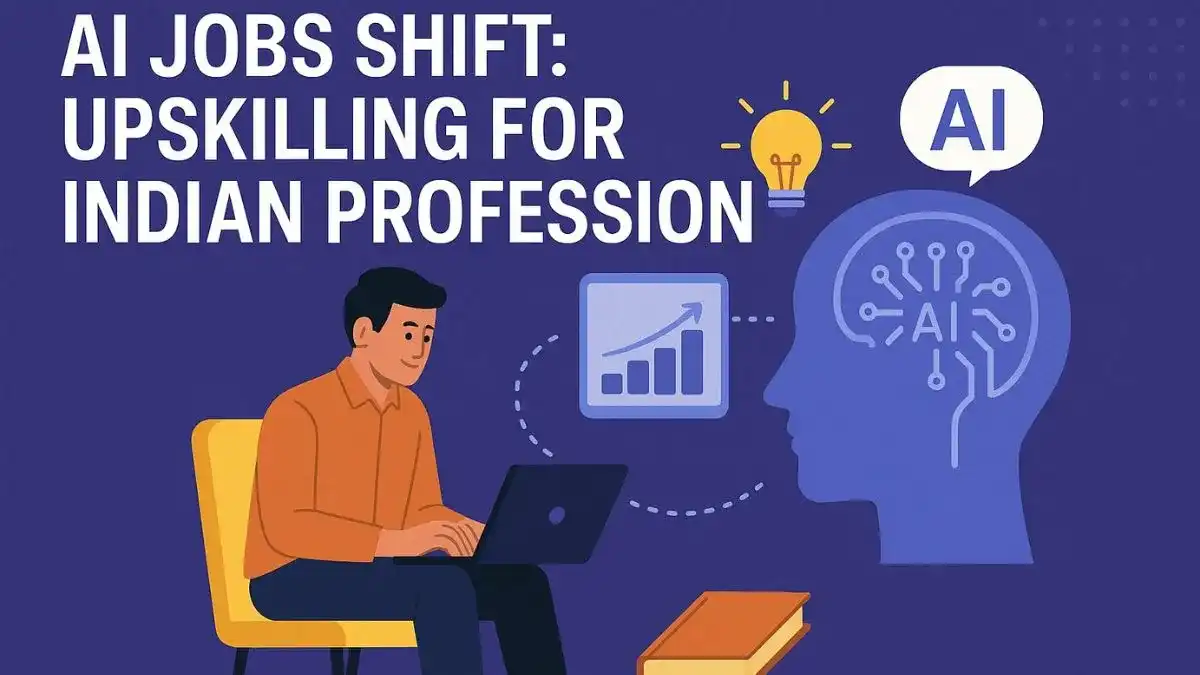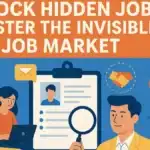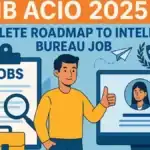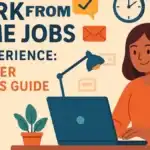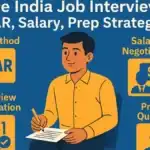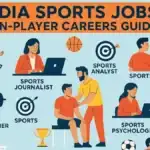Remember that sinking feeling when you hear about another round of tech layoffs in Bangalore? Or when your colleague casually mentions an AI tool doing in minutes what took you days? Meet Priya, a talented graphic designer in Mumbai who loved her job – until client briefs started including “make it AI-generated.” Suddenly, her 5-year experience felt shaky. Her story isn’t unique. Across Pune, Bangalore, and beyond, professionals are realizing yesterday’s skills won’t survive tomorrow’s job market.
Here’s the hard truth: AI isn’t coming – it’s rearranging your office chairs right now. But here’s the better news: this isn’t your career’s apocalypse. It’s your upgrade opportunity. Unlike Priya’s initial panic, you can pivot from feeling replaceable to becoming irreplaceable. This isn’t about chasing tech hype; it’s about strategically future-proofing your value in the workforce. Let’s unpack how.
Why Your Job Description is Secretly Rewriting Itself
Picture Vikram, a Chennai-based financial analyst. His old job? Crunching spreadsheets 8 hours daily. Then his company adopted AI forecasting tools. Overnight, his core task vanished. But Vikram didn’t. Why? He realized AI eliminated calculations but amplified interpretation. He learned to translate complex data insights into boardroom stories – becoming the “AI whisperer” his team needed.
This shift is everywhere:
- Healthcare: AI reads X-rays faster, but doctors diagnosing complex cases? Unreplaceable
- Marketing: Chatbots handle queries, but human strategists crafting brand voice? Essential
- Manufacturing: Robots assemble parts, but engineers optimizing systems? Critical
The pattern? AI handles tasks, but humans own context. Your new job description blends your existing expertise with AI collaboration. That Bangalore tech recruiter isn’t just hiring coders anymore – she’s seeking “prompt engineers” who can make AI tools sing. Scary? Maybe. But full of opportunity? Absolutely.
The Upskilling-Reskilling Tango: Which Dance Floor is Yours?
Upskilling and reskilling sound similar, but choosing wrong is like wearing rain boots to a salsa class. Let’s break it down:
| Upskilling | Reskilling | |
|---|---|---|
| Best For | Your field’s evolving (e.g., accountant → AI-auditing specialist) | Your field’s vanishing (e.g., traditional retail manager → e-commerce ops) |
| Time Investment | 3-6 months (nights/weekends) | 6-12 months (intensive focus) |
| Pune Example | Auto engineer learns EV battery tech | Call-center manager trains as UX researcher |
Take Aisha, a Mumbai journalist. When AI started drafting basic news flashes, she upskilled into investigative data journalism – using those same tools to uncover corruption scandals. Meanwhile, her colleague Rohan reskilled completely into podcast production. Both thrived by honestly assessing: “Is my industry changing, or disappearing?”
Skills That Make AI Your Ally, Not Your Replacement
Forget “learn coding or die.” The AI era’s survival kit is more nuanced:
- The Prompt Mastery: Not coding – but crafting instructions that make AI output useful (e.g., “Compare marketing strategies for IPL campaigns vs. international football” not “Write something about sports”)
- Data Storytelling: Presenting numbers with narrative flair (e.g., turning Bangalore traffic data into compelling urban planning proposals)
- Cross-Domain Thinking: Combining knowledge streams (e.g., healthcare + AI ethics, agriculture + drone tech)
- Emotional Intelligence: Reading unspoken client needs during Pune business lunches
Look at Karan, a Bangalore HR manager. He boosted his value by:
- Using AI to screen resumes faster (saving 20 hours/month)
- Redeploying that time to design mentorship programs (reducing attrition by 30%)
- Becoming the “human touch” expert his tech firm desperately needed
His secret? He didn’t fight the bots – he redirected their efficiency into human strengths. Platforms like Digital Smart Careers offer micro-courses specifically on these hybrid skills.
Your 90-Day Action Plan (No Quitting Required)
Transformation doesn’t require dramatic exits. Start this weekend:
Phase 1: Audit & Observe (Weeks 1-2)
- Scan job postings for your current role on Naukri.com – what new requirements appear?
- Follow AI tools in your field (e.g., Midjourney for designers, ChatGPT for writers)
- Note tasks draining your energy – these are automation candidates
Phase 2: Strategic Learning (Weeks 3-8)
- Pick ONE high-impact skill (e.g., data visualization via Google Analytics)
- Dedicate 45 minutes daily (lunch breaks count!)
- Join free communities like Digital Smart Careers for peer accountability
Phase 3: Apply & Showcase (Weeks 9-12)
- Redo a recent work project using your new skill
- Document results (“Cut report prep time by 40% using AI sorting”)
- Update LinkedIn showcasing specific applications, not vague “skills”
Remember Priya, our anxious designer? She used this method to transition into AI-assisted design. Now she leads client workshops on “human-AI creative collaboration.” Her secret? She didn’t wait for permission – she prototyped her new role.
Learning Without Losing Your Mind (or Job)
Burnout is the silent killer of career pivots. Neha, a Delhi accountant, failed her first reskilling attempt by trying to master data science overnight while working full-time. Her successful second attempt looked different:
- The 5% Rule: Instead of “learn coding,” she aimed for “understand basic Python loops” weekly
- Learning Sprints: Focused 3-week bursts followed by 1-week integration
- Tool Stacking: Used speech-to-text to “study” during her Mumbai local train commutes
Resources like Digital Smart Careers emphasize sustainable upskilling. Their “Microskill Momentum” approach helps professionals like you avoid Neha’s initial burnout trap.
When motivation dips – and it will – reconnect to your “why.” Is it providing for aging parents? Funding your child’s education? Owning a home near Hyderabad’s tech corridor? Tape that vision above your study space.
The Future Belongs to the Adaptable
That anxiety you feel? It’s not weakness – it’s your professional survival instincts shouting, “Stay relevant!” Remember Vikram, our financial analyst? He now trains others on AI tools. Priya consults for design firms navigating AI. They didn’t have special advantages – just the courage to pivot before panic set in.
Your career isn’t a static monument – it’s a living ecosystem. Nurture it with continuous growth, prune outdated skills ruthlessly, and cross-pollinate knowledge across fields. In this AI era, the most valuable professionals aren’t those with the deepest expertise, but those who can learn, unlearn, and relearn the fastest.
Start small today. Audit one skill. Watch one tutorial. Join one community. The bots aren’t taking over – they’re handing you the keys to work smarter. Your upgraded career begins now.
Resource Toolkit: Your AI Career Survival Kit
FAQs:
- “How do I know if I need upskilling or reskilling?” → Ask: “Could I get hired for my current role if it reopened today?” If no, reskill. If yes but shaky, upskill.
- “What if I can’t afford expensive courses?” → Start with free resources (Google Digital Garage, Khan Academy). Many Indian state governments offer subsidized programs.
- “How do I explain this transition to employers?” → Frame it as problem-solving: “Learned X to achieve Y outcome” (e.g., “Mastered basic Python to automate client reports”)
Must-Have Apps:
- LearnTube: Curates free learning paths from YouTube (perfect for Pune’s commute traffic)
- Evernote: Organize learning snippets, project ideas, and skill inventories
5 Instant Action Tips:
- Subscribe to “AI in [Your Industry]” newsletters today
- Redo one current task using ChatGPT (e.g., draft emails, research competitors)
- Identify one colleague doing interesting AI work – invite them for chai
- Block 25 minutes daily for skill-building (use phone reminders)
- Join Digital Smart Careers free webinar on “AI-Proofing Your Income”
